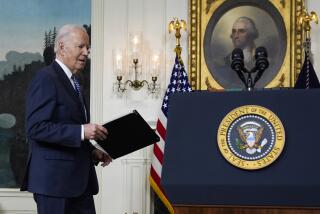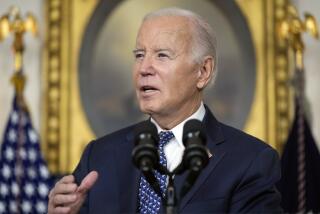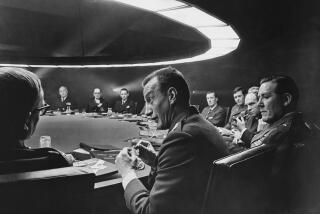Book review: Dick Cheney’s ‘In My Time’
In the 1990s military courtroom drama “A Few Good Men,” Marine Col. Nathan Jessup, as played by Jack Nicholson, faces down an inquisitor who challenges the measures Jessup believed were justified to protect the nation’s security. “You want the truth,” he thunders, “You can’t handle the truth!”
As far as we know, Jessup never wrote an autobiography. But if he did, the tone of it would probably read a lot like that of Dick Cheney’s recently released “In My Time.” In the book, Cheney explains and defends the Bush administration’s policies in the aftermath of the terrorist attacks of 9/11.
It is almost impossible not to hear Nicholson’s growl as Cheney leads us through his eight years as perhaps the most powerful vice president in U.S. history. Laying out his case in a detached, clinical and arid manner, Cheney describes his reaction to events around 9/11, including his decision to order military pilots to fire on civilian airliners if they believed the planes to have been hijacked. Without regret or reconsideration, he recounts discussions on key issues in the U.S. response to the attacks, including the wars in Afghanistan and Iraq, the military detention facility at Guantanamo, the controversy over enhanced interrogation techniques against terrorist suspects, and the expansion of National Security Agency surveillance and intelligence-gathering capabilities. In each case, he pushes back hard against his critics, both outside the Bush administration and within, and makes it clear he would urge the same course of action if given the opportunity to again make those recommendations. Cheney directly and repeatedly challenges his readers to put aside their belief that his conduct on these matters was excessive, illegal or immoral. Instead, he argues without apology that preserving the nation’s safety and security justified the extraordinary measures he championed.
Americans tend to complain when our elected leaders pay too much attention to their own political fortunes. We criticize them for being too influenced by public opinion polls and being obsessed by the campaign for their next office. But because Cheney had no intention of seeking the presidency for himself, he was unencumbered by the electoral controls that normally constrain the decisions of the men and women who run our government. Cheney therefore gives us a rare glimpse into the deliberations of a politician free to utterly disregard politics: The result is a man who answered only to his own conscience. And whether someone thinks that’s good or bad is entirely dependent on whether you agree with his stand on a variety of issues.
Cheney devotes the greatest amount of his memoir to the U.S. military engagement in Iraq. He focuses on the dispute over whether Saddam Hussein had the ability to develop weapons of mass destruction. Cheney is not shy about calling out those who have disagreed with him, and careful reading of the chapters that precede the events of Sept. 11 illustrate his early disregard for the loyalty or job performance of former Secretary of State Colin Powell, former National Security Advisor Condoleezza Rice, former CIA Director George Tenet, former Treasury Secretary Paul O’Neill and other Bush administration figures.
Most interesting and more complicated are Cheney’s feelings about former President George W. Bush. He applauds Bush for decisions in the first few years after the 9/11 attacks. But he seems demoralized by the change of course in Bush’s second term, when the vice president possessed less influence and clearly felt marginalized by his diminished role. He expresses disappointment over the firings of his longtime ally Defense Secretary Donald Rumsfeld and, later, Joint Chiefs chairman Gen. Peter Pace and over presidential hesitance in policy decisions regarding Iran, Syria and North Korea. But Cheney expresses his greatest displeasure for Bush’s decision not to pardon vice presidential advisor I. Lewis “Scooter” Libby for his conviction regarding his role in the administration’s leak of the covert identity of CIA agentValerie Plame.
Cheney defends his former aide at great length, pointing out that Libby was not the source of the leak and ultimately telling the president that he was “leaving a good man wounded on the field of battle.” Pretty strong words to direct at the commander in chief. But ultimately, even Bush could not live up to Cheney’s standards.
Throughout the book, Cheney makes little effort to emotionally engage his readers. His fictional counterpart Jessup, not surprisingly, used far stronger and more extravagant language in his cinematic courtroom encounter to make the same substantive argument, that unpopular and uncomfortable measures are necessary to protect a country from grave danger. The words here are Nathan Jessup’s, but the sentiments are unmistakenly Cheney’s as well:
“We live in a world that has walls, and those walls have to be guarded by men with guns… my existence, while grotesque and incomprehensible to you, saves lives. You don’t want the truth because deep down in places you don’t talk about at parties, you want me on that wall, you need me on that wall.”
Jessup was ultimately found guilty in a military trial, while Cheney was instead judged by a court of public opinion. This book is both men’s appeal, leaving us with difficult and troubling questions regarding the balance between the sober necessity of our physical safety and the higher moral plane of our democratic ideals.
Schnur is the director of the Jesse M. Unruh Institute of Politics at USC. He was an advisor to former Gov. Pete Wilson and the 2000 presidential campaign of John McCain.
More to Read
Sign up for our Book Club newsletter
Get the latest news, events and more from the Los Angeles Times Book Club, and help us get L.A. reading and talking.
You may occasionally receive promotional content from the Los Angeles Times.






